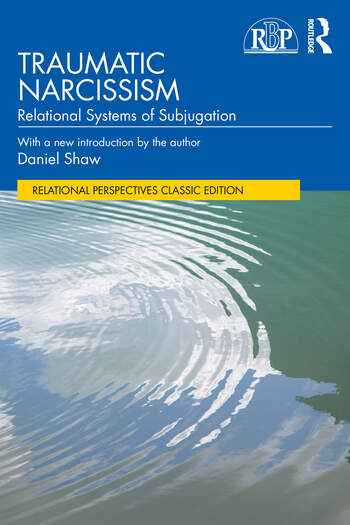Traumatic Narcissism: Relational Systems of Subjugation

Book Details
- Publisher : Routledge
- Published : 2025
- Cover : Paperback
- Pages : 246
- Category :
Forthcoming - Category 2 :
Psychoanalysis - Catalogue No : 97994
- ISBN 13 : 9781032867014
- ISBN 10 : 1032867019
Reviews and Endorsements
Daniel Shaw’s exploration of the dynamics inherent in psychological abuse related to highly narcissistic parenting is thoroughly psychoanalytic, but it also is so trauma treatment savvy as to be breathtaking in its scope.
Richard Chefetz, author of Intensive Psychotherapy For Persistent Dissociative Processes: The Fear of Feeling Real
Daniel Shaw's Traumatic Narcissism is a must read as a cutting edge relational approach to helping patients free themselves from the destructive impact of the relationships they have with traumatic narcissists.
Lawrence Josephs, Adelphi University, American Psychological Association
This book belongs on my shelf between Leonard Shengold’s Soul Murder (Shengold, 1989) and Bernard Brandchaft’s pathological accommodation work (Brandchaft, Doctors, & Sorter, 2010). To these irreplaceable resources, Shaw adds not only his extensive studies of the precise mechanisms of soul destruction in cults and cult-like groups (such as allegedly therapeutic cults and the large group awareness trainings—LGATs) , as well as his own description of cult-like families ruled by traumatizing narcissists.
Donna Orange, International Journal of Psychoanalytic Self Psychology
This is a serious, clearly written, clinically informed book written from an insider's perspective. Shaw inhabits the experiential worlds he depicts, and he knows his subject deeply. WEaving together disparate threads, Shaw works toward a position that places our willingness to acknowledge vulnerability and need, and our ability to withstand shame, as the cornerstones of transformational therapy work. Shaw's writing seeks and inspires partnership. His efforts to grapple with his subject invite our participation as readers. He demonstrates expertise, but his voice is not that of the expert. He writes in an egalitarian spirit... I highly recommend Shaw's instructive and evocative work and have, on more than a few occasions, recommended it to friends, students, and patients whose responses confirm my sense that this is a book with much to teach us. Shaw's book should and, I supsect, will inspire considerable interest in our field and will facilitate a useful critical analysis of our clinical approaches to working with the narcissistic dimension of experience.'
Eric Mendelsohn, Division|Review
Readers will be compelled by Daniel Shaw's differentiated and lucid account of relational trauma and non-recognition in the shaping of what has been called narcissism. The book's intelligent and compassionate portrayal of clinical dilemmas involved in working with those who have suffered in abusive subjugating relationships is ideal for students and advanced practitioners. Traumatic Narcissism offers an original and captivating analysis of the relational configurations and painful emotions that lead to and so often prevent emergence from submission. While his thinking is informed by a broad theoretical knowledge, equally impressive is Shaw's exemplary dedication to exploring how we can use our own experience and personal honesty in order to transcend shame and confront the pitfalls of being an analyst while still maintaining our focus on recognizing the patient.'
Jessica Benjamin, author of Shadow of the Other
Daniel Shaw has written a fascinating book that places his personal psychological journey in the well-researched context of his larger compelling theory of traumatic narcissism. Inspired by his own experience in a cult with a guru whom he eventually came to see as a traumatizing narcissist, and enlivened with numerous clinical case examples, this absorbing and far-ranging book traces the history of traumatic narcissism from ancient times to the vagaries of the current political scene.
Sheldon Bach, PhD, adjunct clinical professor of psychology, NYU Post Doctorial Program in Psychoanalysis
This book is a must-read for any of us who have worked with victims of traumatizing narcissists or been their victims ourselves. Whether drawing on his personal experience in the clinic and in cults, or analyzing literary productions and the inner worlds of their creators, Dan Shaw brings vividly to life the relational world of those bent on subjugating others - and of those who have been subjugated by them. Not since Benjamin’s The Bonds of Love has there been such a powerful analysis of the psychic life of domination and submission, complemented by a moving account of the effect of analytic love. Perhaps only someone like Shaw, who has known firsthand the psychic effects and needs fulfilled by living in a world of traumatizing narcissists, could have provided such a compassionate and helpful guide for clinicians engaged in the painful work of helping those who have been drawn into the traumatizing narcissist’s relational system.
Lynne Layton, Harvard Medical School and Massachusetts Institute for Psychoanalysis
Daniel Shaw has written an astute, dramatic portrayal of the traumatizing narcissist’s subjugation and destruction of another’s subjectivity as it emerges in families, cult-like groups and even in the psychoanalytic profession itself. He boldly offers "analytic love" as the avenue of restoration of subjectivity. Professionals of all levels will be riveted as they expand their understanding of these phenomena.
James L. Fosshage, Ph.D., clinical professor of Psychology, New York University Postdoctoral Program in Psychotherapy and Psychoanalysis
Dan Shaw's fine study of what he calls "traumatic narcissism" explores the toxic forms of self-involvement in areas as diverse as the life of Eugene O'Neill, a number of his patients, and in his own experience with a guru. Shaw is at his best, however, exploring some of the dark corners of the cultic world of psychoanalysis itself. He holds a mirror up to those who claim the authority of self-understanding. Not all reflect well. Wisely, for all the anger and despair in this book, Shaw ends in hope that is cautious but authentic.
Charles B. Strozier, an historian at the City University of New York and a practicing psychoanalyst

